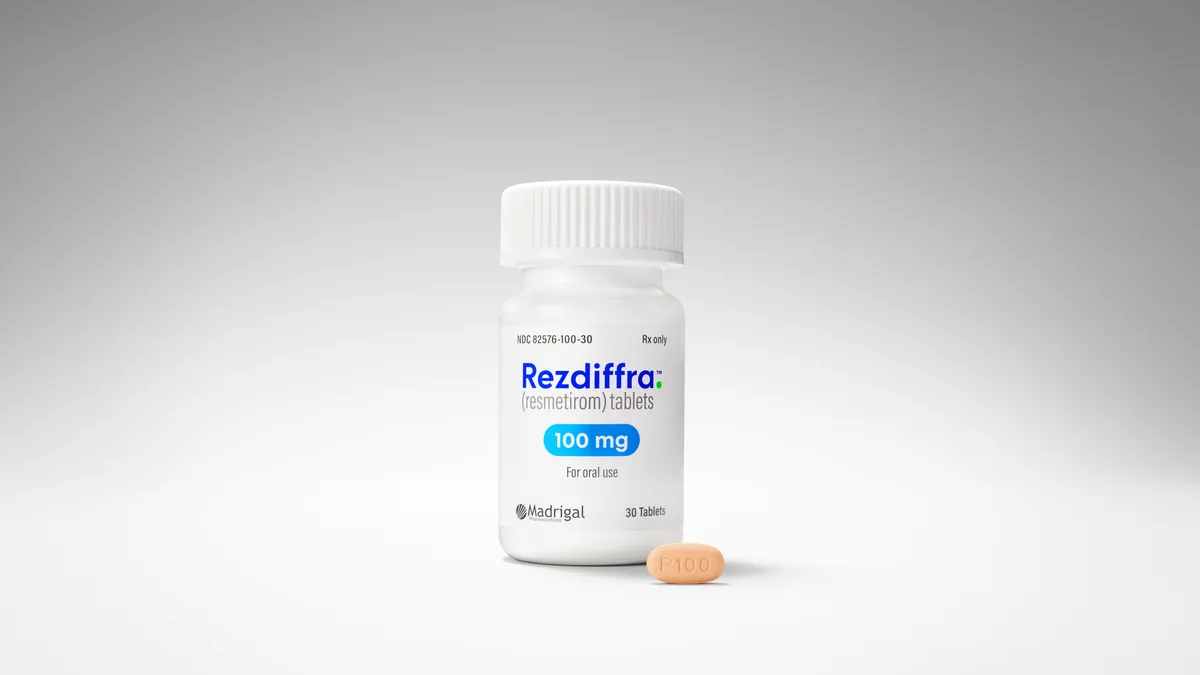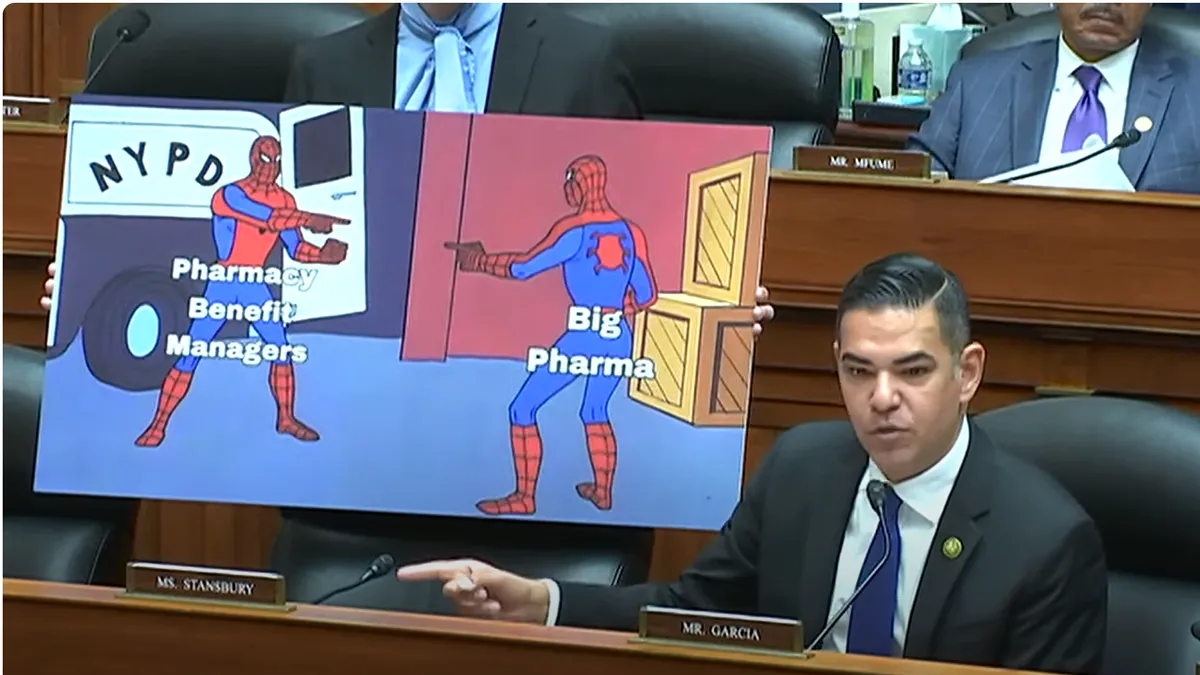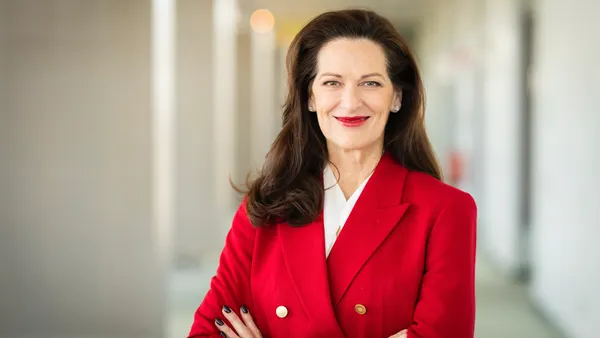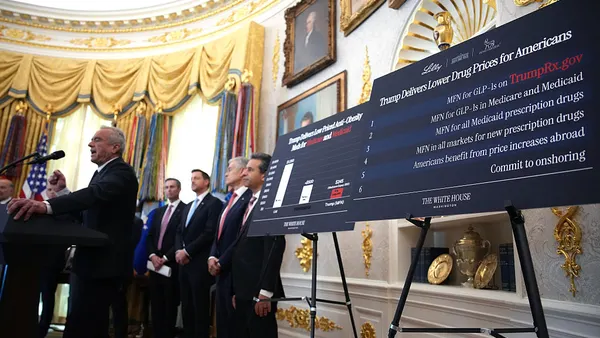When Madrigal Pharmaceuticals secured its history-making approval of Rezdiffra last year for metabolic dysfunction-associated steatohepatitis — the liver disease MASH — the path to commercial success was littered with snags.
First and foremost, the drugmaker had to blaze a trail for the serious liver disease caused by fat accumulation, which can go symptomless for long periods of time. With no prior drugs on the market, there was also no established care pathway.
Despite the challenges, Madrigal’s rollout has consistently beat expectations, including in the third quarter this year with more than $287 million in net sales. Now on pace to exceed $1 billion for the full year, Rezdiffra is the de facto MASH leader. But the monopoly was short-lived.
Novo Nordisk’s weight loss blockbuster Wegovy earned FDA approval for MASH in August, causing Madrigal shares to temporarily dip and raising questions regarding Rezdiffra’s future as a MASH standout.
“It’s an unusual stance, but we are very welcoming of other drugs coming to the market because it will increase the awareness of MASH.”

Adama Sall
VP, head of patient experience and access, Madrigal
Rivals incoming
Madrigal hopes it can maintain a healthy lead in the face of new competition that’s set to grow as several late-stage drugs near approval. Notable contenders include three fibroblast growth factor 21 drugs that have spurred deals with Big Pharma.
The phase 3 drug candidate pegozafermin, developed by 89Bio, was the subject of a Roche deal, and late-stage efruxiermin from Akero Therapeutics was a Novo Nordisk target. GSK also entered the fray to acquire efimosfermin as part of a larger deal for Boston Pharmaceuticals.
Using a different modality, Boehringer Ingelheim is advancing the dual glucagon/GLP-1 receptor agonist survodutide licensed from Zealand Pharmaceuticals.
Can Rezdiffra stand up to the stiff competition?
Madrigal built its Rezdiffra foundation on a narrow, clearly defined patient population of about 315,000 people diagnosed with MASH who have moderate to advanced liver fibrosis and are already under the care of a liver specialist.
The drugmaker’s small marketing team maintains a patient-centered focus, said Adama Sall, vice president, head of patient experience and access at Madrigal. The aim is to help doctors match the drug to the right patient — and overcome barriers like cost and awareness to keep them coming back. Currently, Rezdiffra has more than 10,000 prescribers.
Sall said company leaders remain confident in the drug despite the expanding competitive landscape, and perhaps even bolstered by it.
“It’s an unusual stance, but we are very welcoming of other drugs coming to the market because it will increase the awareness of MASH,” Sall said. “I think they’re going to help diagnose more patients.”
Navigating a changing market
Madrigal depends on cross-functional collaboration and AI-driven responsiveness to data to keep the momentum going, Sall said.
“Because we’re a small company, we’re able to act on insights very rapidly,” she said, noting that while the core approach has remained the same, new information has prompted technical pivots.
But key to the strategy are relationships the company has made with prescribers and patients, as well as strong partnerships with advocacy groups, she said.
“We invest a lot in trying to think about the pain points that hepatologist and gastroenterologist offices are facing … and the pain points that our patients are facing that go beyond the drug,” Sall said. “How can we address that, and how can we help them in a compliant way?”
A Madrigal patient support team targets cost challenges, which are a major reason many Americans either abandon or don’t even begin treatment. Patients sometimes hear the drug’s $47,400 annual price tag and assume it’s out of reach.
“They don’t realize that there are so many solutions that actually make the drug affordable,” Sall said.
Holistic patient support
Because people taking Rezdiffra also need to make lifestyle changes such as diet and exercise, Madrigal provides additional support including tailored nutrition education. The company plans to roll out a digital patient companion app to track medication, activity and nutrition.
The team is now planning on helping people move beyond primary care to find MASH specialists through website resources and awareness campaigns. They’re also intent on solving other challenges physicians face: learning how to stage the disease and gaining access to necessary equipment.
“There's a high need for education in the community, even in [gastrointestinal] offices,” Sall said. Another goal is to expand the Rezdiffra provider base, and Madrigal is also investing in endocrinologist education in MASH, she said.
“[MASH] can be a very scary diagnosis,” Sall said. “We want to continue investment … to better support our patients to stay on therapy.”










